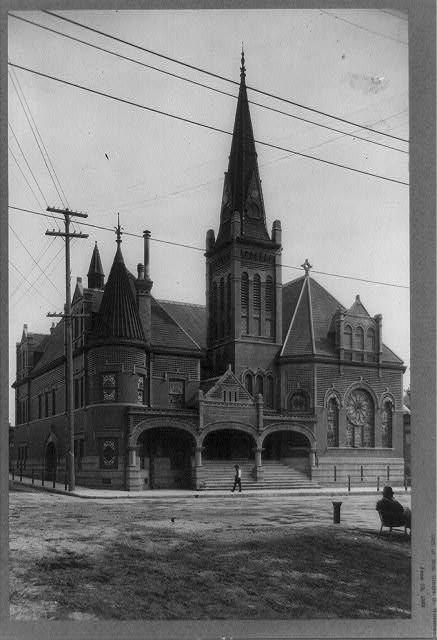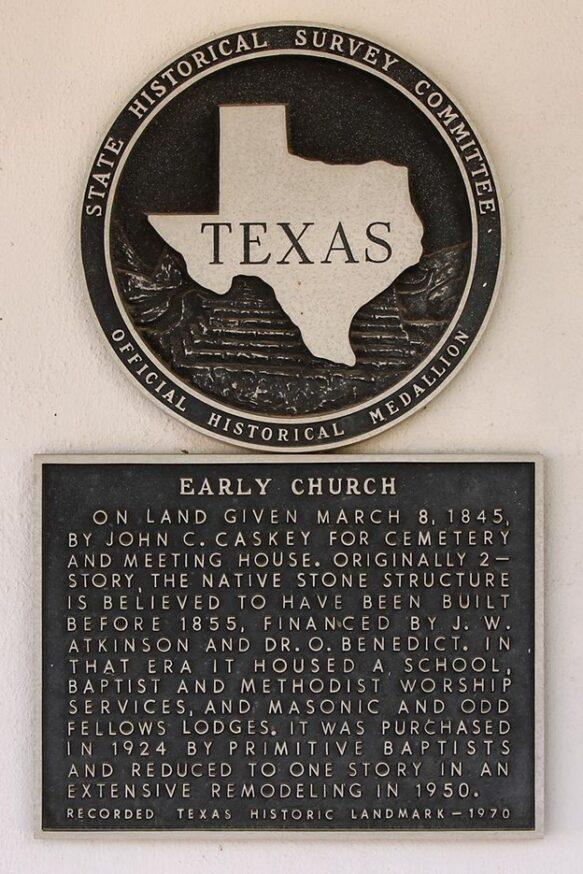The world’s largest online family history resource - Start now
-
Black History Month – Ancestry Initiatives to Honor Black Heritage -
Marking 80 Years Since Auschwitz Liberation: Our Commitment to Holocaust Remembrance -
1921 Census of England & Wales Now Available -
Updated Ancestral Subregions
GET THE LATEST
New posts + monthly newsletter.
GET THE LATEST
New posts + monthly newsletter.
When you’re researching your lineage, sometimes it’s the small details—a baby’s baptism date or their godparents’ identities—that truly transform your family history from black and white to living color. For many Texas families, church formed the cornerstone of daily life, providing not only religious services, but a community hub—a place to socialize, to celebrate joyous occasions, and to mourn the passing of loved ones. Perhaps more importantly, churches often kept detailed records of the events that took place within their hallowed halls, and they did so well before 1790 when the U.S. Census first started collecting comprehensive data about the U.S. population.
If you don’t think you can trace your roots to Texas, you might be surprised. Alongside the state’s Native American citizens, Early Texans hailed from all over Latin America and Europe. In fact, even if your family wasn’t Catholic, you may find records that are useful to your genealogical efforts.
So, if you’re hoping to trace your family tree back before 1790—or find that early U.S. Census records don’t provide the rich details you’re looking for—you may have better luck with Texas church records. They often predate the census and may offer specific information on your ancestors’ lives that you wouldn’t otherwise uncover.
Long before the government kept detailed records, churches recorded baptisms, marriages, deaths, burials, confirmations, events, and more. These records can help you find your distant great-grandparents born the generation before the census, so you can continue extending your family tree.
Although church records are likely available for most religious organizations in America and foreign countries, Texas church records may be especially useful if your family has roots in the area.
The History of Catholic Church Records in Texas
Although Catholicism is roughly 2,000 years old, its history in Texas began much more recently—in the early 1600s. At this time, the first of several Spanish settlements was established near the site of modern-day El Paso. The establishment of this settlement and the many that followed were largely the work of Franciscan missionaries, who brought their strong Catholic beliefs and devout practices along with them.
Along with considerable help from the Franciscan missionaries, Spain established a chain of 35 missions throughout modern-day Texas between 1690 and 1794. Perhaps the most famous of these missions is The Alamo, which began as the Mission San Antonio de Valero in 1718 and was the site of an infamous battle in 1836.
With the development of these missions, Catholicism became written into the fabric of American history. Recent statistics show more than 4.5 million Texans still practice Catholicism today, making it the one of the state’s most prominent religion.
Types of Texas Church Records for Genealogy Research

Texas Catholic church records online at Ancestry® are available to you for genealogy research. Many Catholic archives of Texas are online and indexed, so you can easily search and find the information you’re looking for.
Here are a few examples of record types you may find in your Texas church records search on Ancestry:
- Baptism records: Baptism is a religious rite followed by several belief systems, including Catholicism. In baptism records in Texas, you may find a person’s name, the date of their baptism, and their parents’ information. Since godparents often play a fundamental role in Catholic baptisms, you will likely find their information listed too. These people may be of interest, since the roles of godparents are often filled by extended family members or close friends of the child’s parents.
- Marriage records: Catholic Texas marriage records can help you fill in the blanks on spouses and, sometimes, even trace back another generation. These records will generally include the names of both spouses, the wedding date, and the location of the ceremony. Sometimes, the parents’ names and their locations are listed if they weren’t present at the ceremony.
- Death records: Churches often kept death records and separated them from burial records. Church death records often only include the deceased’s name and the place and date of their death. However, you may find additional information in these records. For example, the cause of death may also be listed, along with the name of a spouse or parents.
- Confirmation records: Confirmation is a largely Catholic practice that generally takes place during a person’s teen years. Often, these records will only include a person’s name, date of confirmation, and church. However, confirmation records can help establish a birth year since you’d know your family member was a teen on the date of their confirmation.
- The Alamo Church records: Church records from the infamous Alamo are extensive and include a wide array of record types. You can find records dating back to 1700, although some may be written in Spanish. You may also find Latin words or phrases since the Catholic Church, historically and modernly, uses Latin in its records.
All of these records can be found with the Ancestry collection of U.S. Church Records. You can refine your search to include only church records from Texas and define the type of record you’re looking for to narrow down results. If you’re looking for a specific family member, you can also refine results based on their name.
Language Tips for Searching Texas Church Records
When searching Texas church records, you may find it helpful to understand some basic Spanish and Latin phrases, as the Catholic Church in Texas commonly used these for its records.
A few basic Spanish phrases you may find useful include:
- Nombre = Name
- Nacimiento = Birth
- Muerte = Death
- Bautizad = Baptized
- Matrimonio = Marriage
- Hija de = Daughter of
- Hijo de = Son of
- Esposo = Husband
- Esposa = Wife
- Madre = Mother
- Padre = Father
A few basic Latin phrases you may find useful include:
- Nomen = Name
- Natus est = Was born
- Renatus est = Was baptized/was reborn
- Conjuncti sunt/ Copulati sunt/ intronizati sunt = Were married
- Mortuus est/ Obitus est/ denatus est/defunctus est = Died
- Mater = Mother
- Pater = Father
- Filia – Daughter
- Filius = Son
- Vir = Husband
- Uxor = Wife
Tips For Searching Texas Church Records
A few tips you may find useful when searching Texas church records for your genealogy efforts include:
- Refine your results: If your search turns up many results, consider refining them with information on the relative you’ve already verified. For example, searching for “John Doe” may provide thousands of results. But if you refine that search with an approximate date of birth and the father’s first name, you may only have dozens or hundreds of results instead.
- Name variations: Remember that not everyone knew how to spell their names in the 1700s or 1800s, so it may be helpful to search for other name variations. In many cases, the religious dignitary documenting the event may have made best guesses on how the name was spelled, leading to some inconsistencies throughout the records.
- Keep records and take notes: Save relevant church records or images to your family tree for easy access later, which can be helpful if you find conflicting information. Add notes about the small details to your family tree during your search. For example, if you learn the name of your great-great grandmother’s best friend, make a note, so you remember this interesting life detail.
Church Records Today

Today, you can find church records online to help you build your family tree. Historic church records are now public information and include records up to the 1990s. If your family wasn’t Catholic, you may still find specific records that prove useful to your genealogical efforts. The reason why may surprise you.
In countries or regions that were predominantly Catholic, the church often kept records of the whole population on behalf of the government. These practices may extend to historical eras, such as the original Spanish settlements in modern-day Texas.
Of course, if you’re not finding any luck with Catholic church records, you may want to try researching other American church records. Ancestry has Evangelical Lutheran Church records dating back to 1781 and Presbyterian Church Records dating back to 1701.
Ancestry has a comprehensive collection of Catholic Texas church records you can use to explore your roots and discover key details about your family members. Start a free trial today to explore your heritage and uncover more about how your relatives lived their lives.
Sources
-
- https://www.census.gov/history/www/faqs/demographic_faqs/when_was_the_first_census_in_the_united_states.html
- http://www.lonestargenealogy.com/courses/texas/migration.html
- https://www.worlddata.info/religions/catholics.php
- https://digitalcommons.andrews.edu/cgi/viewcontent.cgi?article=1173&context=dissertations
- https://texasourtexas.texaspbs.org/the-eras-of-texas/spanish-colonial/
- https://www.texasalmanac.com/articles/the-spanish-missions-in-texas
- https://www.texasalmanac.com/articles/the-spanish-missions-in-texas
- https://www.thealamo.org/remember
- https://www.texasalmanac.com/articles/religious-affiliation-in-texas
- https://guides.library.umass.edu/c.php?g=672399&p=4737804
- https://www.archindy.org/archives/files/Sacramental%20Records.pdf
- https://research.colonialwilliamsburg.org/Foundation/journal/Winter11/literacy.cfm
- Image 1: https://www.loc.gov/item/2017740966/
- Image 2: https://www.loc.gov/item/91789410/
- Image 3: https://commons.wikimedia.org/wiki/File:Early_Church_Florence_Texas_Marker.jpg
























